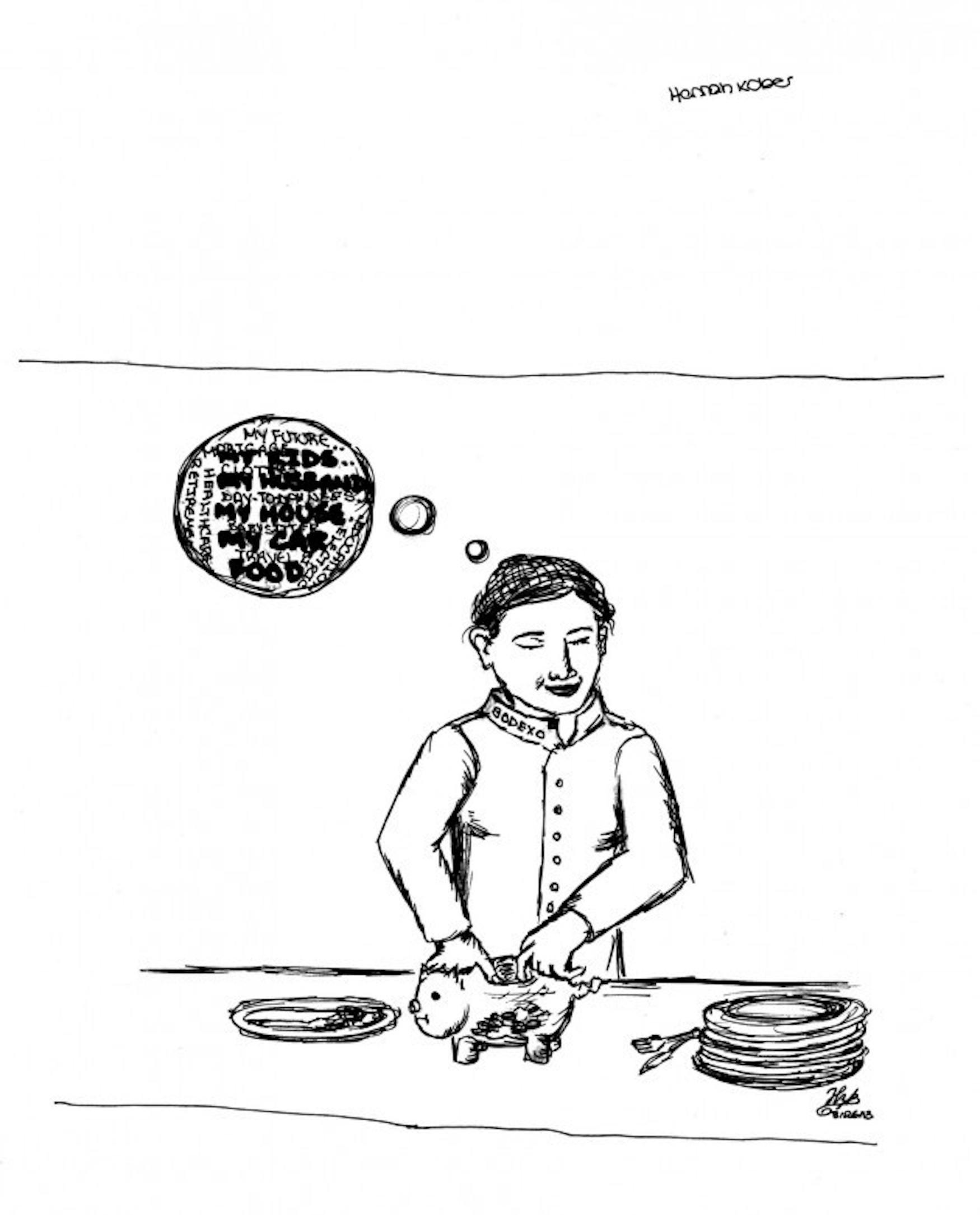Campus dining workers deserve a living wage
Returning Brandeis students will likely be glad to find our former dining subcontractor Aramark replaced by a new company, Sodexo. For the entirety of my time at Brandeis, there were complaints about Aramark, from the quality of the food to the availability of varied dietary options. I hope for the sake of our community that those issues will be redressed. But I also hope that this moment of change is utilized for the new possibilities it offers to our workers, not only to our students.
Among all of the issues I heard raised with regard to Aramark over the years, their failure to pay workers a living wage was rarely among them. Now, Sodexo is poised to take up Aramark's legacy of failing to pay a living wage to our dining workers.
A living wage is determined by calculating the minimum income a person would require to meet their basic needs in a given time and place. Compared to a minimum wage, which is legally mandated and often relatively static, a living wage is determined by focusing on the specific costs of living in a particular area, such as housing, transportation and supporting dependent family members. According to a source involved in contract negotiations, the lowest-paid workers hired by Aramark in 2013 would have made only $12.32 an hour. Workers hired by Sodexo starting this year will only make $12.51 an hour. The increase is negligible, and constitutes less than half of a living wage.
In Massachusetts, the minimum wage is eight dollars an hour. Working full time at that rate, a worker could expect to make $16,640 a year, putting them barely one thousand dollars above the federal poverty line, supposing they have only one dependent family member. Even if that wage is doubled to $16.00 per hour, estimates based on the real cost of living in Middlesex County suggest that a worker with one preschool-aged child would still be unable to adequately maintain secure access to housing, utilities, childcare and food. The Crittenton Women's Union, a social service and advocacy organization that works to advance the rights of low-income workers, estimates that a living wage in Middlesex County for an adult with one preschool age child would be around $27.00 per hour. Put simply, the lowest-paid workers employed by Sodexo on our campus will make 46 percent of what it takes to get by.
Studies on the effects of poverty have repeatedly shown that it has lifelong consequences for those who live and grow under its privations. For adults, poverty can increase one's risk of suffering from serious mental health issues, which are especially harmful when time away from work is punished by increasingly dire financial circumstances. Coming Up Short, a forthcoming book by Jennifer Silva, reveals that poverty seriously undermines long-term stability in relationships, and can render marriage and co-parenting untenable. A recent federally funded study conducted in Philadelphia on children with in-utero exposure to crack cocaine found that poverty is far more harmful to children's growth, development and health than exposure to drugs in the womb. Regardless of whether one is single, building a family or growing up in one, poverty is detrimental to all elements of life.
Harvard University, Swarthmore College and Johns Hopkins University are among the many institutions of higher learning that have campaigned for living wages for workers on their campuses. I believe it is time that Brandeis joined their ranks. It is difficult to carry out our mission as a University to support learning, community engagement and social justice when we are not providing members of our community with the opportunity to flourish. And I believe that it is human flourishing, not resignation to a series of minimums, that should underpin our thinking when it comes to wage policy.
During my time at Brandeis, I devoted my time and energy to supporting the impoverished members of our community in Waltham. I coordinated Waltham Group's Hunger and Homelessness department, founded a meal donation program and served as the board secretary of Waltham's Community Day Center, a homeless shelter with a robust program of community services. But all of my work focused on lending aid to people who were in urgent need of assistance-that is to say, people who had already been let down by the precariousness of living on the poverty line. I do not regret my work at Brandeis, but I regret that I did not do more to prevent the circumstances that I saw daily working with people who lacked secure access to food, shelter and healthcare.
You now have that opportunity. Sodexo's arrival signals a moment of change, and it is in that pivotal moment of possibility that the potential for progress is at its greatest. Do not be discouraged by the complacency of the students who came before you: We did some, and we should have done more. But now, the advancement of justice comes down to you. Remember that incremental gains are far superior to stasis, and that even a small increase in wages can mean a world of difference to a person struggling to support themselves and family members on meager income. In the coming year as you adjust to Sodexo or meet our new dining subcontractor for the first time, please work together to maximize the positive impact of this change not only for students, but also for our dining workers. Fight for a living wage.
Liz Stoker '13 is an alumna of Brandeis University and a former columnist for the Justice.



Please note All comments are eligible for publication in The Justice.